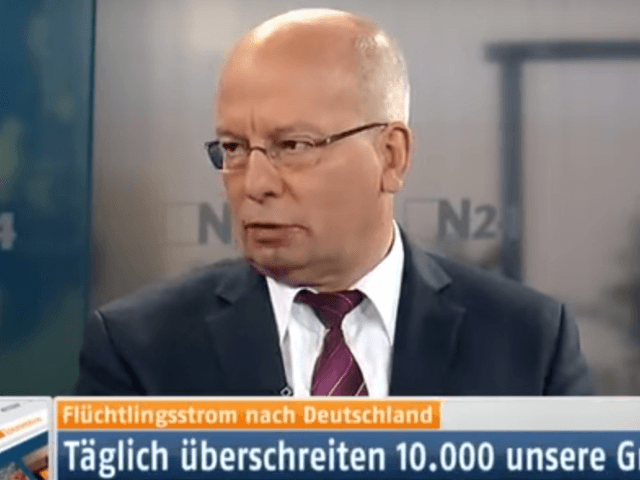The chief of the German police union has said that the migrant influx – forecast to hit 1.5 million by the end of the year – has left the nation’s police forces “overwhelmed” as they tackle sectarian conflict and “extreme criminal offences.”
Rainer Wendt (above) said new arrivals lacked respect for and knowledge of German law, which was insufficient to prosecute asylum seekers, and called for extra protection for women, children and Christians.
Mr Wendt has been Federal Chairman of the German Police Union since 2007. He welcomed new tougher asylum policy passed by the German parliament, particularly in relation to Balkans migrants, as a “good sign” but questioned why “things always have to go up in flames” before politicians “react.”
“This should’ve happened at least a year or so ago when we saw the first signs of the chaos,” he said in an interview with broadcaster N24.
Earlier in the month Breitbart London reported on the first comprehensive social and scientific study on violence in migrant centres in Germany, which revealed that conflict is part of “everyday life” for inhabitants and is likely to increase.
The “ultimate and primary cause” was ethnic and religious tensions, researchers said. Clashes at a migrant camp near the central German city of Kassel on September 28th left 14 people injured, including three policemen, and in October 7th around three hundred migrants brawled in a migrant centre in Braunschweig.
“In our asylum camps all hell broke loose; at the border in southern Germany, and in Bavaria especially, it’s hell. Our colleagues down there can’t ever take their boots off [to rest] anymore,” said Mr Wendt, naming struggling federal forces all over Germany.
He said some were “heavily overwhelmed. And now politicians are acting like they’re totally surprised… they should’ve reacted a lot sooner.”
Explaining that the police now had to simultaneously guard hundreds of new camps whilst attempting to quell the “criminality among the refugees; meaning rapes of women and of children, massive use of violence, criminal activities such as exploitation, slavery, we see it all there.”

An asylum centre ransacked this August in Thuringa after pages of the Koran were torn
Isolated crimes are not the problem, “not just little squabbles,” he said; “not because they’re living in cramped spaces; theses are territorial conflicts, dominance struggles.
“I mean, fanatical religious groups that can’t be separated easily.”
Mr Wendt said private security being used in the camps was not qualified to deal with such complex sectarian conflict and German police were only respected “to a point.”
“They don’t respect our rule of law,” he said, claiming that current legislation is ill-equipped to bring prosecutions and act as a serious deterrent.
Some new arrivals, “instinctively know that our laws are weak, and they know that no matter how badly they behave, it has absolutely no consequence for their asylum status.”
Migrants, he said, “pretty much can do whatever they please, and the state barely reacts.
“The judiciary and the political part of the state should make it very clear to these people from the get-go, that in this country Sharia does not apply – or any other religion – but that here in Germany the rule of law applies, and that we are ready to enforce that.
“This is not about family squabbles; we are talking heavy crime, extreme criminal offences.”
Up until July, around 40 per cent of male asylum seekers in Germany were from the Balkans – all deemed safe countries by the EU. “Germany need[s] to open up the deportation facilities again,” he added.
In Mr Wendt’s view, if asylum seekers commit crimes during the application process it should be “quite possible that they will have to await this while sitting in prison.”
The presenter asked if he agreed with segregating migrants along ethnic and religious lines, which is already happening in some asylum centres in the German state of Thuringia. He said:
“No, I believe that is not the solution. The thought behind this is to a degree a sign of helplessness. By separating them, that is hardly even possible – even for religious reasons alone it is difficult.”
How would they be separated he asked: “The Sunnis from the Shiites? The moderate Salafists from the radical Salafists? When they’re in the end all followers of the Muslim belief system, it’s just not possible.”
He said the same was true for separating along ethnic lines. “Creat[ing] parallel societies among the refugees, it just wouldn’t work.”
Some groups, however, could do with some extra protection, as recent attacks have shown; “such as women, families and children, and especially Christians.”

COMMENTS
Please let us know if you're having issues with commenting.